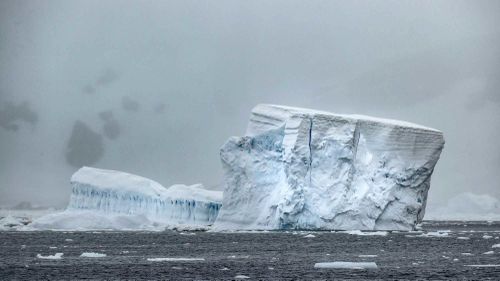Share this @internewscast.com
A group of international scientists set out to establish what a “safe limit” of warming would be for the survival of the Greenland and Antarctic ice sheets.
They pored over studies that took data from satellites, climate models and evidence from the past, from things like ice cores, deep-sea sediments and even octopus DNA.
What they found painted a dire picture.

The world has pledged to restrict global warming to 1.5 degrees Celsius above pre-industrial levels to stave off the most catastrophic impacts of climate change.
Even if the world sustains today’s level of warming, at 1.2 degrees, it could still trigger rapid ice sheet retreat and catastrophic sea level rise, the scientists found.
The Greenland and Antarctic ice sheets together hold enough fresh water to raise global sea levels by around 65 metres â an unlikely scenario but one that must be acknowledged to fully understand the risk.
Since the 1990s, the amount of ice they’ve lost has quadrupled; they are currently losing around 370 billion tonnes a year. Ice sheet melting is the dominant contributor to rising seas and the rate of annual sea level rise has doubled over the past 30 years.

Multiple studies suggest 1.5 degrees of warming is “far too high” to prevent rapid ice sheet retreat that would be irreversible on human timescales, and the world should prepare for many feet of sea level rise over the coming centuries, according to the study.
“You don’t slow sea level rise at 1.5, in fact, you see quite a rapid acceleration,” said Chris Stokes, a study author and glaciologist at Durham University.
It’s an existential threat to the world’s coastal populations. Around 230 million people live less than 1 metre above sea level. Even small changes in the amount of ice held in the ice sheets will “profoundly alter” global coastlines, displacing hundreds of millions of people and causing damage that stretches the limits of adaptation, the study found.
Seas could surge by 1 centimetre a year by the end of the century, within the lifetimes of young people now, the scientists found.
At this level, which equates to 1 metre a century, “you’re going to see massive land migration on scales that we’ve never witnessed since modern civilisation,” said Jonathan Bamber, a study author and glaciologist at the University of Bristol.
There are still huge uncertainties about where tipping points lie. The way climate change unfolds is not linear and it’s unclear exactly when warming might trigger rapid retreat and even collapse.
What’s hugely concerning, the study authors say, is that the best estimates of “safe” temperature thresholds for saving the ice sheets keep going down as scientists better understand their vulnerability to climate change.
Early modeling suggested temperatures would need to hit around 3 degrees of warming to destabilise the Greenland ice sheet, for example, but recent estimates suggest it would only take around 1.5 degrees.
To avoid the rapid collapse of one of more ice sheets means limiting global warming to closer to 1 degree above pre-industrial levels, the study authors concluded.
This would require drastic cuts to the amount of fossil fuels humans burn, something which looks exceptionally unlikely as countries including the US continue to embrace oil, coal and gas.
The world is already starting to see some of the worst-case scenarios play out in terms of ice loss, Stokes said.
“There’s very little that we’re observing that gives us hope here,” he said. “The absolute best-case scenario is that sea level rise is slow and steady,” he added.
The findings don’t mean the world should give up on climate targets, as every fraction of a degree of warming translates to worse impacts, Stokes said.
“Limiting warming to 1.5 will be a major achievement. It should absolutely be our target, but in no sense will it slow or stop sea level rise and melting ice sheets.”












